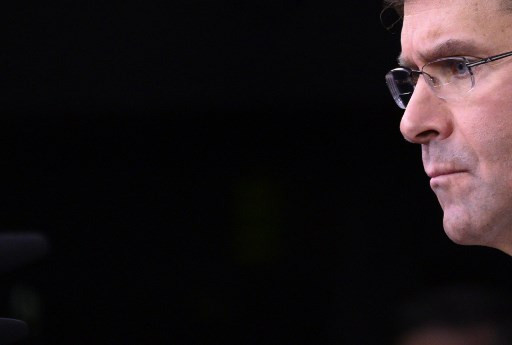Popular Reads
Top Results
Can't find what you're looking for?
View all search resultsPopular Reads
Top Results
Can't find what you're looking for?
View all search resultsUS defense secretary to visit Indonesia amid increased tension with China
Change text size
Gift Premium Articles
to Anyone
W
ith the United States renewing its campaign against China in the Indo-Pacific theater, Defense Secretary Mark Esper expressed his intention to visit Indonesia to strengthen the cooperation through arms sales despite recent reluctance from the Indonesian side.
Speaking in a virtual briefing organized by the International Institute for Strategic Studies, Esper said his department encouraged all allies and partners to purchase American equipment.
“Why? Because first and foremost it brings us together, secondly it improves our interoperability in case something does happen and third we think they are a better alternative to anything else out there. So for those reasons we continue to talk about arms sales between our countries,” he said.
Earlier this month, the Defense Security Cooperation Agency (DSCA), an agency under the US Department of Defense, announced the possible sale of eight V-22 Osprey aircraft and related equipment worth some US$2 billion to Indonesia. However, Indonesian officials appeared to be backtracking from the deal, with one saying the purchase was “not included in the plan for the development of the primary defense system.”
The last US weapon systems Indonesia acquired was the Boeing AH-64E Apache Guardian attack helicopters with naval capabilities. The contract value was US$1.42 billion for eight helicopters and related equipment. All eight helicopters have been delivered to the Army Aviation Center in Semarang.
Esper and Prabowo had a phone call discussion on bilateral defense priorities, including military readiness and defense acquisitions in late March.
“My view is that we can continue to meet and have discussions. I’ve done it several times with the defense minister and I hope to visit Indonesia during my tenure as well,” Esper said.
He said his country had good relations with Indonesia and he had spoken to Defense Minister Prabowo Subianto several times this year.
“As we talk, he understands that we fully support Indonesia’s sovereignty, that we support as partners trying to push back against China’s malign behavior in the region particularly as they contest Indonesia’s EEZ [exclusive economic zones] there,” he said.
Earlier this year, President Joko “Jokowi” Widodo had to visit Indonesia’s Natuna regency and deploy coast guard patrol boats and Navy warships to ward off Chinese fishing vessels assisted by its own coast guard operating in Indonesia’s EEZ.
A country can exercise its sovereign rights within 200 nautical miles of its EEZ and full sovereignty within 12 nautical miles of its territorial seas.
Indonesia has no overlapping territorial claim with China, but the Natuna Sea is located adjacent to the South China Sea, a highly disputed body of water, a majority of which is claimed by China based on historic rights that were invalidated by a 2016 international tribunal ruling.
The South China Sea issue remains a thorn in China’s relations with its Southeast Asian neighbors, who are increasingly concerned over China’s apparent militarization in the disputed waters. Its aggressive claims have led to clashes with Vietnam, the Philippines and Malaysia, some of the countries located around the waters.
The US has reasserted its position over the South China Sea maritime dispute in the last weeks by calling out Beijing’s activities in the disputed waters as “completely unlawful”.
Speaking about the US Indo-Pacific priorities, Esper said the US military was emphasizing the three pillars of the Indo-Pacific strategy: preparedness, strengthening partnerships and promoting a more networked region.
He asserted that the military played a role in the whole-of-government approach in the region. "We are not only prioritizing the development and deployment of game-changing technologies such as hypersonic weapons, 5G and artificial intelligence, but we are also investing in platforms critical to the Indo-Pacific and transforming the way we fight," the secretary said.
He also welcomed the growing trend in multilateral cooperation in the region, including talks between defense ministers under the Five Eyes, an intelligence alliance between the US, Britain, Canada, Australia and New Zealand, as well as other multilateral discussion with Japan and Australia.
"We are encouraging Indo-Pacific nations to expand their own intra-regional security relationships and networks of like-minded partners," he said.










